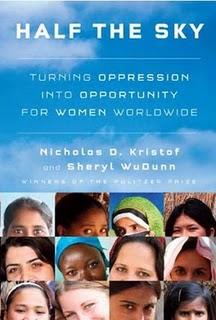Half the Sky: Turning Oppression into Opportunity for Women Worldwide

In Half the Sky, Nicholas Kristof and Sheryl WuDunn lay out a powerful argument about the importance of development work paying heed to gender. Since both Kristoff and WuDunn are well-known and respected journalists, this book will undoubtedly be widely read and influence policy and practice. Skillfully composed of narratives of women’s plight and resistance in Africa and Asia, the authors incorporate scientific and policy research to support their argument. They attempt to outline some of the most significant ways in which women’s oppression plays out; through sex slavery, inadequate maternal health care, rape, and lack of education. The book is obviously a labor of love, and the couple draws their first person narratives from their travels around the globe to bear witness to these situations.
Kristof and WuDunn deal respectfully with issues of cultural relativity, including an insightful and knowledgeable chapter on Islam and its relationship to sexism and women, but they fall short of thoroughly addressing issues of power and privilege in their own relationships to the issues. While they allude several times to critiques of cultural imperialism—mentioning women who have challenged them on their presence and role in the struggles of women from the variety of countries included here—they never seem to delve into the matter deeply, offering blanket statements about morality that are supposed to supersede these critiques.
The authors pay lip service to the leadership of the women most affected by the issues at hand; they also write with a clear intention of encouraging involvement of affluent Americans of all genders through philanthropic and missionary projects. Without passing judgment on these sorts of interventions, what was missing in their analysis was a clear role for the history of colonization and neoliberalism in shaping the relationships between the US and Africa and Asia.
This book will undoubtedly serve as a call to arms to take more seriously the issues facing poor women in Africa and Asia. My only worry is that in ignoring the role of colonialism and capitalism in shaping these problems, the solutions offered will fall short. In one of the final chapters, the authors defend sweatshops from liberal critiques, arguing that because garment work employs women and elevates their economic status above men’s, they can only be a good thing. While sweatshops may, in fact, provide an important source of income for women in impoverished countries, I find their blindness to the ethical and moral implications of such labor practices in contradiction with their righteous stances against sex slavery and other abhorrent practices.
All in all, Half the Sky is an educational and accessible read. The authors have clearly done their research and present an arsenal of knowledge and narrative that supports their call to action. In the midst of economic crisis, while we bear witness to the collapse of American capitalism, I hesitate to endorse a strategy of empowerment for women in “developing countries” that is a path to the same. Perhaps other readers will be inspired to find more creative solutions than the ones offered by the authors.
Wow, Anonymous, I hope you're wrong or my heart will be shattered!
Sorry, but I found your review very disappointing. WuDunn and Kristoff remind me of nineteenth century Victorians who were incensed by footbinding but were also against women's suffrage. WuDunn and Kristoff will never have any credibility with me until they apologize for their cruel and completely unfair remarks about the feminist movement and discuss their commitment to making their marriage less patriarchal. I don't believe for a NY minute that Nicolas does 50% of the housework and childcare and I have never seen any evidence that he made MAJOR career sacrifices so that his spouse could develop in her career.
WuDunn and Kristoff don't want to end patriarchy. They just want third world women to live in the same type of patriarchy that first world women live in. I do not trust them.
Wow, I really want to read this book! I love N Kristof (I've yet to read the work of WuDunn Knopf).
"...they never seem to delve into the matter deeply, offering blanket statements about morality that are supposed to supersede these critiques."
Can you give an example or two?
And in terms of the sweatshops, I read a column by Kristof and his point was that it's better than nothing, not that it's awesome that poor women work at sweatshops! Still, very problematic, yes.
I completely agree with Anonymous in that the book discards the feminist movement in a very intellectually dishonest way. How ironic that in their call to united action against global injustices against women, they play the game of disowning and discreting the women's movement in the US, for fear I assume of being labelled "feminists". Their remarks about feminism are truly regrettable, insulting, and in the end counter-productive. I feel the authors are trying to appropriate the movement without the label. Fine, but they do not have to distroy the label in the process. Your review could have addressed this issue! Sure a capitalist critique wouldbe interesting, but perhaps not relevant to the level of poverty dealt with in the book.